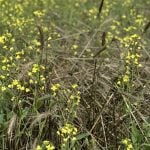University of Manitoba researchers are testing whether fall rye and oat nurse crops can reduce flea beetle pressure on young canola without hurting yield


The technique can definitely hide the seedlings from the insects but it comes with a yield effect attached


In a stressful market environment, best practices can reduce risk and drive profit

The challenges of growing mustard in the shadow of canola


Finding flea beetles and lygus bugs in canola fields doesn’t necessarily mean they’re a problem. Sometimes lygus bugs can even benefit the crop

Experts discuss pests and pathogens canola growers will want to watch for in 2024

A recent study investigated the effect of plant density on flea beetle populations in canola crops

The latest findings on flea beetle control products

Five important tips when applying foliar insecticides